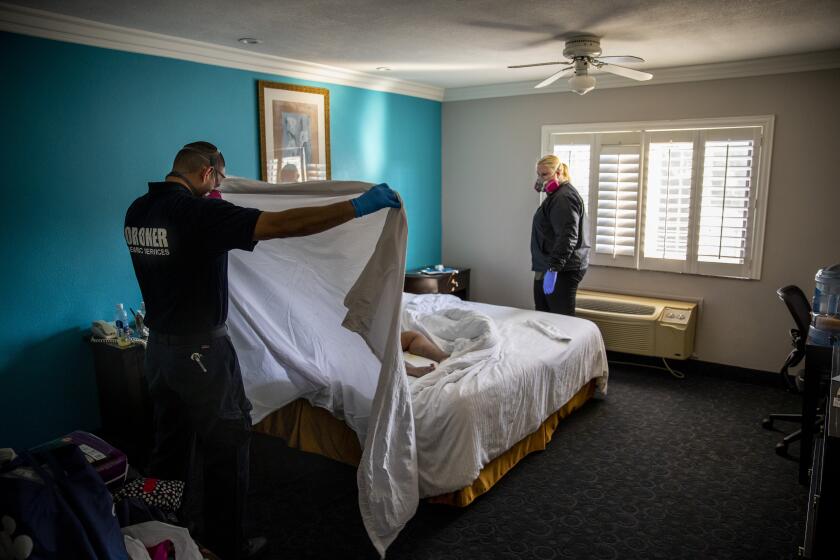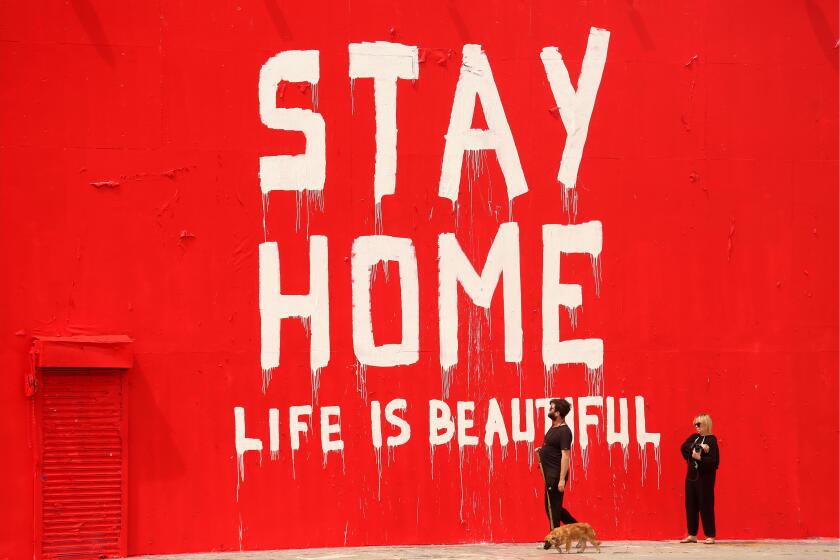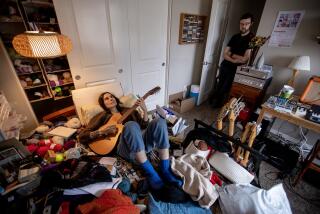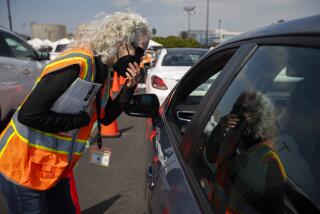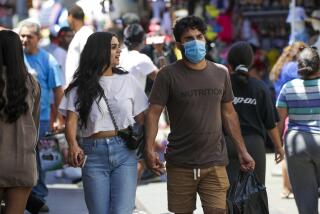A pregnancy loss, a coronavirus diagnosis and a recovery in isolation
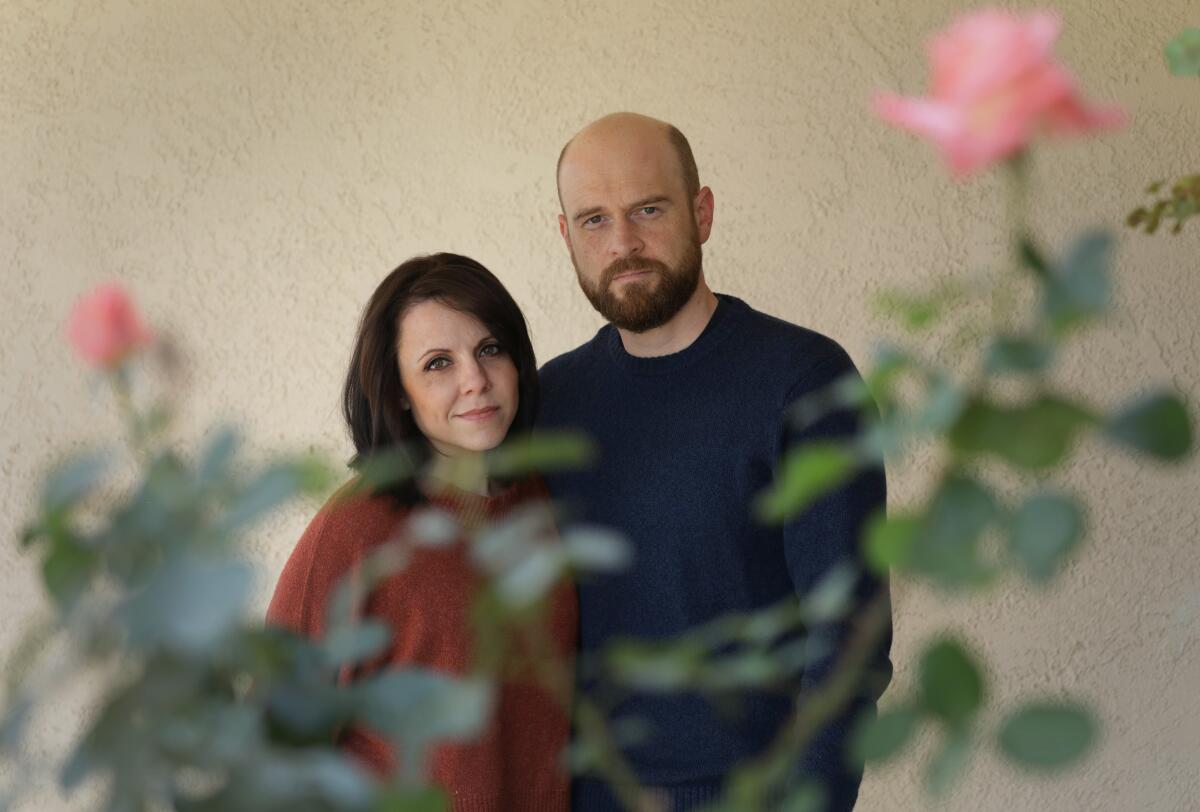
- Share via
In the predawn hours on the Saturday before Thanksgiving, Alyssa Fetters awoke her fiance in severe pain.
Fetters was six weeks pregnant and had learned about two weeks prior that her pregnancy was ectopic — when the egg grows outside of the uterus. Learning that there would be no way for the egg to survive and that her own health could be in danger, she had already started the difficult treatment to stop the cells from growing.
On that Saturday morning, something had gone wrong.
Mark Fitzgerald drove his pregnant partner to the emergency room and then, due to COVID-19 protocols, was forced to wait for word outside the walls of the hospital. Over the phone, he would learn that the egg had ruptured and that Fetters would be prepped for emergency surgery to tend to her internal bleeding.
When she awoke, safe, in an anesthetic daze, Fetters learned that she had tested positive for the coronavirus. She was asymptomatic but, per protocol, was rushed to the hospital’s COVID-19 wing, where her physical and emotional recovery in isolation began.
::
“In the grand scheme of things, we’re really lucky. We’re both still working, we’re both still in our home,” Fetters, 36, said. “But it was horrible — I wouldn’t want it to happen again.”
More than 2 million people have tested positive for the coronavirus in California. More than 20,000 have died, and thousands more have faced a tenuous recovery. In every instance, the infection sentences a person to isolation, away from family, roommates and friends. Some have had to bear the burden in a hospital room; others have been more fortunately able to return to their living spaces. There, the sick and the healthy are often separated by a mere wall, when home becomes a haven and a confine.
Californians who have isolated or quarantined after a coronavirus exposure told The Times that even when the physical distance between loved ones is slight, the emotional distance can sometimes feel vast.
“No hugs, no touching my wife of 33 years, no life really for more than a week. It was depressing and at times infuriating,” said William Burns, 66, of San Diego after he was exposed to the virus at work.
For others, restlessness looms.
“The quarantine fell over two birthdays, so kids couldn’t celebrate their birthdays with the family in our small bubble. Arguing and restlessness were frequent,” said Alison Evans, 47, of Moorpark.
In the case of Fitzgerald and Fetters, that need for separation arrived with the weight of trauma. But the time to process their loss together would have to wait.
“It would have been our first child,” Fetters said.
::
Fitzgerald, who recently turned 40, retrieved his fiancee from the hospital at about 10:30 that Saturday night. He learned a few days later that he had tested negative for the virus, but already he had turned their bedroom into Fetters’ domain and shifted all of his attention to her recovery.
“I was definitely compartmentalizing things,” he said. “I was very much focused on the moment and what she needed.”
Fitzgerald would enter the room wearing gloves and a mask while helping Fetters to the bathroom, delivering her food and nursing her back to health. But contact would remain limited. Fetters utilized the Alexa app to speak to Fitzgerald from the bedroom, and the couple FaceTimed each other from inside the house.
The dogs were kept outside the room. At one point, the cat broke in, allowing Fetters to spend some moments with a visitor.
“All I wanted was my mom,” Fetters said. But endangering someone else’s health wasn’t a risk she was willing to take.
Fetters, a developmental therapist who works with children on their foundational developmental skills, and Fitzgerald, a production manager at an animation studio, met five years ago. They planned to get married in October, but like so many others, postponed until next year to avoid burdening guests financially or putting them through unnecessary fear.
Their focus soon turned to starting a family.
::
When Fetters’ isolation period had ended, she and her fiance embraced. The couple held each other for the first time in weeks.
In time, they will process and look toward the future. For now, they will continue to hold each other up, one day at a time.
“On Dec. 31, we’ll have a drink, we’ll celebrate the ball dropping. Then I’m ready to wake up in 2022,” Fitzgerald said, knowing that 2021 will not begin with perfection. “It’s been one hell of a year.”
More to Read
Sign up for Essential California
The most important California stories and recommendations in your inbox every morning.
You may occasionally receive promotional content from the Los Angeles Times.
